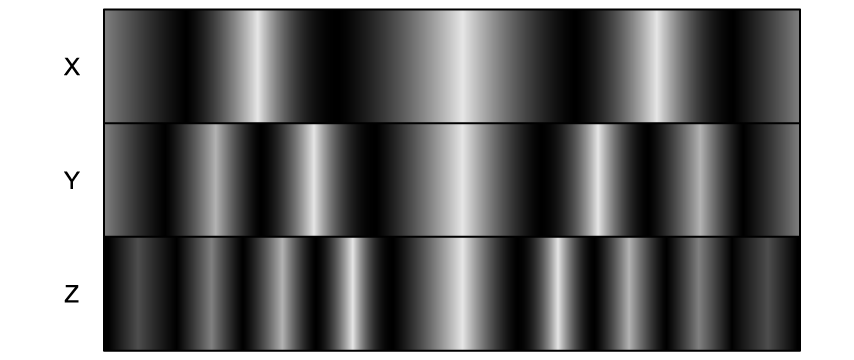A source of sound is placed in front of a barrier that has an opening of width comparable to the wavelength of the sound.
A sound detector is moving along the line PQ. The centre PQ is marked X.
(a)
(i)
On the axis below, sketch a graph to show how the intensity, I of the sound varies as the detector moves from P to Q.
[2]
(ii)
State the effect on the intensity pattern of decreasing the wavelength of sound.
[1]
Assess your score
View Answer
(b)
The angle between the slit, X and the first location after X where sound is not detected is 102.8°. The slit has a width of 4 mm.
(i) Calculate the wavelength of the sound used in this experiment.
[1]
(ii) Calculate the path difference of the sound from both slits at this point.
[2]
Assess your score
View Answer
The width of the slit is now increased. Now, when the sound detector is moving along the line PQ, sound is detected at P, then at X and then at Q.
(c)
(i)
Explain the effects of a wider slit on the diffraction pattern.
[2]
(ii)
Label the points P, X and Q on the horizontal axis of the graph shown.
[2]
Assess your score
View Answer
(d) The slit width is now 30 m. The same source of sound is used throughout.
(i)
Calculate the angle between the slit, X, and the first location where sound is detected after X.
[2]
(ii)
Explain how moving the screen further away will change the interference pattern.
[2]
Assess your score
View Answer
Next Question
The formula for the position of the first minimum of the diffraction pattern produced by a single slit is given by:
(a)
Using the conditions for interference, derive this formula.
[4]
Assess your score
View Answer
The frequency of monochromatic light passing through a slit is 2.44 × 1014 Hz. The screen is located 3.75 m from the single slit. The distance on the screen from the central maximum to the first minimum is 0.25 cm.
(b)
Find the slit width.
[3]
Assess your score
View Answer
Three diffraction patterns, x, y and z, are produced from three wavelengths of light, λ , 5λ and 10λ, passing through a slit of fixed width b .
(c)
(i)
State the wavelength of light that produced each diffraction pattern, x, y and z.
[2]
(ii)
Explain which pattern has the highest intensity at the central maximum and state how to increase the intensity at the central maximum.
[2]
Assess your score
View Answer
The graph below shows the variation of light intensity, I with angular displacement θ on a screen placed far away from a narrow slit.
(d)
Draw the variation of light intensity, I with angular displacement θ on a screen when the narrow slit is been made even narrower.
[2]
Assess your score
View Answer
Previous Question Next Question
Plane wavefronts of monochromatic light of wavelength λ are incident on a rectangular slit of width b . The light is brought to a focus after passing through the slit on a screen at a distance D from the slit as shown in the diagram below.
The width of the slit is comparable to the wavelength of the light and b ≪ D . The point X on the screen is opposite the centre of the slit.
The variation of the intensity incident on the screen with angle θ is shown on the graph below.
(a)
Explain the shape of the intensity distribution in terms of the conditions for interference.
[3]
Assess your score
View Answer
(b)
The angular half-width of the central maximum for this intensity distribution is given by the expression φ = θ = φ.
Derive an expression for the half-width, d , of the central maximum using the terms, D , λ and b .
[3]
Assess your score
View Answer
In a single-slit diffraction experiment, the slit width is 0.030 mm and the wavelength of the light incident on the slit is 525 nm.
(c)
Calculate the angle of diffraction for the second maxima.
[2]
Assess your score
View Answer
The single slit of width b is replaced with rectangular slits, of width 2. The intensity distribution of a single slit is shown by the dotted line.
(d)
Draw a sketch within the central maxima of the single slit of the new intensity distribution on the screen.
[3]
Assess your score
View Answer
Previous Question Next Question
An experiment is set up where white light is incident on a single slit.
(a)
The white light illuminates the slit. The first diffraction minimum for a wavelength of 630 nm is observed at 12°.
(i)
Calculate the slit width.
[1]
(ii)
Describe and explain what would happen to the diffraction angle if the slit width was made narrower.
[2]
Assess your score
View Answer
(b)
(i)
Identify the first secondary maximum and the second diffraction minimum on the single slit intensity graph below.
[2]
(ii)
Determine the wavelength of light for which the first secondary maximum occurs at an angle of 12°.
[2]
Assess your score
View Answer
(c)
Explain why the central maximum is white but the first secondary maximum at 12° is coloured.
[3]
Assess your score
View Answer
(d)
Explain the pattern of the colours seen on the screen between 12° and the next minima.
[3]
Assess your score
View Answer
Previous Question Next Question
A rectangular slit has width b and is comparable to the wavelength λ of plane wavefronts of monochromatic light incident upon it. After passing through the slit, the light is brought to a focus on a screen.
The diagram shows a line normal to the plane of the slit, drawn from the centre of the slit to the screen is labelled PQ. The points X and Y are the first points of minimum intensity as measured from point Q.
The diagram also shows two rays of light incident on the screen at point X. Ray RX leaves one edge of the slit and ray PX leaves the centre of the slit. The angle φ is small.
(a)
On the diagram, label two angles of diffraction.
[2]
Assess your score
View Answer
(b)
Derive an expression, in terms of λ, for the path difference RT between the rays RX and RT.
[4]
Assess your score
View Answer
(c)
Describe the changes in the experimental setup that would decrease the width of the central bright maximum.
[4]
Assess your score
View Answer
In a certain demonstration of single-slit diffraction λ = 400 nm, b = 0.12 mm, and the screen is a long way from the slit.
(d)
Calculate the angular width of the central maximum of the diffraction pattern on the screen.
[2]
Assess your score
View Answer
Previous Question









